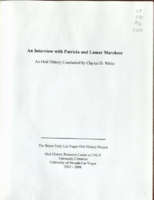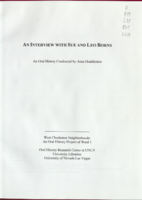Search the Special Collections and Archives Portal
Search Results

Jahaira Farias interview, April 12, 2019: transcript
Date
Archival Collection
Description
Interviewed by Monserrath Hernández and Barbara Tabach. Jahaira Farias is a graduate of Western High School, a Marine Corps veteran, and a founder of a local chapter of the Women Marines Association. At the time of this oral history, Jahaira worked for US Congresswoman Susie Lee. Jahaira Farias was born in Las Vegas, Nevada, and grew up on the west side of town. She has summertime memories of her travels to Mexico, where she was able to connect with her family's heritage and language. During her years at Western High School, she participated in varsity sports and was the armed drill team commander. After graduation, Jahaira enlisted into the Marine Corps, where she specialized as a transport operator and hazardous material transporter and served two deployments in Iraq and Afghanistan. Her transition to civilian life included work in security at Caesars Palace. When she took a position with as district representative for Congresswoman Susie Lee, her focus was to assist veterans and immigrants. She helped Rep. Lee develop community outreach towards the Latinx community and Veterans. Jahaira is the president of the Las Vegas NV-3 Sagebrush Marines chapter of the Women Marines Association, an organization she helped establish and rebuild. The WMA helps veterans find their footing again through mentoring and support, and conducts community engagement by fostering the same camaraderie found in the Corps. After surviving a motorcycle accident, Jahaira's recovery is nothing short of miraculous, going from being in a wheelchair to competing in Tough Mudder. Now extremely active, Jahaira is an avid hiker and certified yoga instructor, specializing in trauma recovery. A polyglot, Jahaira formally studied Arabic and Russian, and speaks English, Spanish, and Pashto, and received an associate degree in Russian from the College of Southern Nevada.
Text

Transcript of interview with Pat and Lamar Marchese by Claytee White, January 16, 2008
Date
Archival Collection
Description
Pat Marchese grew up in Johnston, Pennsylvania, and Lamar was reared in Tampa, Florida. Pat was raised on a farm surrounded by relatives. Lamar takes pride in his mother heritage, which can be traced to Tampa Bay, Florida, in the early 1840's. Pat and Lamar graduated from the University of South Florida and relocated to Las Vegas in 1972. Pat's remarkable 30-plus year passion includes working for the city of Las Vegas and Clark County, Nevada. She created numerous art and cultural programs which consist of the Civic Symphony, Charleston Heights Arts Center, Rainbow Company Theatre, along with consulting work for the Allied Arts Council. In addition, to her creating art and cultural agendas, she became a budget analyst and chief lobbyists for the county, testifying before the Senate Taxation Committee. She implemented through the public arts program, a Mural Arts Series, the Parks and Recreation Cultural Division, and culture on the Strip. Pat executed the grant that ensured the necessary funding for the expansion for public broadcasting radio stations throughout California, Utah, Arizona and Nevada. She's certainly worthy of her title "Queen of Las Vegas Culture". Lamar's amazing 30-plus year's calling comprises putting into action an abundant number of libraries programs for the State of Nevada along with establishing the first public broadcast radio station in Nevada. His library accomplishments include merging the City's libraries branches, library programs, shows, concerts, unification of academic libraries and public libraries and the first reciprocal borrowing agreement for the State of Nevada with the Nevada library card. He consolidated Las Vegas Libraries and the Las Vegas Clark County Library District. He also sold bonds for the development of future libraries. Lamar's broadcasting achievements consist of incorporating the Nevada Public Radio Corporation with State of Nevada, serving as Chairman of the board for NPRC, constructing broadcasting translators and radio stations throughout the tri-state and enveloping the State of Nevada through public broadcasting. Combined, Pat and Lamar Marchese have served the Las Vegas community for over six decades. Thanks to the Marcheses, broadcasting is thriving throughout the tri-state area, libraries are blossoming and cultural programs are flourishing. They are looking forward to retiring, traveling, spending time with loved ones, and most of all, Pat and Lamar time together.
Text

Transcript of interview with Leo Borns and Sue Easley Borns by Anna Huddleston, March 21, 2014
Date
Archival Collection
Description
Leo and Sue (Easley) Borns came to Las Vegas in 1962 to begin an architectural career that would last forty-four years in Southern Nevada. Leo Boms worked for various firms in Las Vegas before developing a reputation as "F. Borns, Architect". He has gone on to design buildings for state public works, Clark County, the City of Las Vegas, Clark County School District, churches, and private home owners. Rarely taking a job outside of Southern Nevada, Leo Boms' intent was to develop an architecture considered indigenous to the area while keeping the conservation of energy and technology as prime importance. Mr. and Mrs. Boms, after living in the area for approximately five years, decided to purchase a home on Strong Drive in McNeil Estates where they raised their three children. Active in social and philanthropic organizations, both Leo and Sue have become acquainted with numerous area personalities. Mr. Boms is most proud of being a part of the development of the Kiwanis Water Conservation Park although his structural designs can be seen throughout the Southern Nevada area. At the age of 77, he closed his office but remains an integral influence on the Greater Las Vegas area.
Text

Jack K. Leavitt interview, February 28, 1979: transcript
Date
Archival Collection
Description
On February 28, 1979, collector Alick Dziabczenko interviewed Jack Leavitt in Las Vegas, Nevada. In this interview Mr. Leavitt talks about his childhood in Las Vegas. He also talks about his family life and his career in the city, as well as some of the many changes he has seen in Las Vegas.
Text

Relda W. Leavitt interview, March 18, 1976: transcript
Date
Archival Collection
Description
On March 18, 1976, collector David Steele Broussard interviewed Relda Whitney Leavitt (born April 3rd, 1917 in Saint Thomas, Nevada) at her home in Las Vegas, Nevada. In this interview, Mrs. Leavitt discusses growing up in Saint Thomas, Nevada before her family moved to Las Vegas. She also discusses moving to Las Vegas, Nevada and her family’s dairy business in Whitney, Nevada. She speaks about the different changes and growth she has seen in Las Vegas over the years.
Text

Al Lermusioux interview, March 9, 1978: transcript
Date
Archival Collection
Description
On March 9, 1978, Shirley Dianne Long interviewed Al Lermusiaux (b. 1926 in Corrales, New Mexico) about his work in construction in the Las Vegas Valley. Lermusiaux begins by talking about his move to Las Vegas, his family and what brought him to the city. He shares many anecdotes about the construction of different iconic buildings in Las Vegas, the inner workings of the business, payments to employees and the changes in technology. Lermusiaux, in particular, talks of the telephone system in the fifties and the changes in structures and their regulations. During his interview, Lermusiaux lays out an image of old Las Vegas and Henderson, giving detailed descriptions of the layout of the city, the projects he worked on and the effects of the weather on building structures in Las Vegas.
Text

Nanyu Tomiyasu interview, April 12, 1977: transcript
Date
Archival Collection
Description
On April 12, 1977, collector Mark French interviewed Nanyu Tomiyasu (born May 28th, 1918 in Las Vegas, Nevada) at the University of Nevada, Las Vegas. In this interview, Nanyu Tomiyasu discusses growing up and working on his father’s (Bill Yonema Tomiyasu) farm in Las Vegas, Nevada. He also discusses how his father came to Las Vegas and being one of the few Japanese families in Las Vegas as a child.
Text

Transcript of interview with Kathleen Bryan Gaston by Niki Rodriguez, March 17, 1981
Date
Archival Collection
Description
On March 17, 1981, Niki Rodriguez interviewed Kathleen Bryan Gaston (born 1949 in Las Vegas, Nevada) about her experience living in Southern Nevada. Gaston first talks about her father who moved to Las Vegas and eventually became a justice of the peace, and she also describes how her parents eventually moved to Las Vegas. Gaston later describes how Las Vegas looked as she was growing up and how it has developed since, specifically mentioning the schools she attended and the growth of the Las Vegas Strip.
Text

Floyd Jenne interview, 1996: transcript
Date
Archival Collection
Description
Jenne discusses his birth in Ogden, Utah in 1915, his early life in Northern Nevada in 1920s, and his later life in Boulder City, Nevada working as a reclamation ranger for the Bureau of Reclamation. Jenne begins the interviews discussing his work as a steel foundry worker and miner in McGill, Nevada, studying forestry, and enlisting in the Civilian Conservation Corps at Utah State University in 1934. Jenne then describes his experiences moving to Boulder City and working as a reclamation ranger. Other topics Jenne covers include providing security for notable Boulder City and Hoover Dam (Boulder Dam) visitors and patrolling the area. Lastly, Jeanne talks about the Boulder City Junior Chamber of Commerce, Boulder City's incorporation, and Boulder City law enforcement.
Text

Transcript of interview with Phyllis Webb Clark by Lorna Suzette Clark, April 7, 1976
Date
Archival Collection
Description
On April 7, 1976, Lorna Suzette Clark interviewed her mother-in-law, Phyllis Webb Clark (born 1928 in Los Angeles, California) about her experiences from living in Las Vegas. The two first discuss education, the various address at which Phyllis lived, and the early development of the Strip and Downtown areas. The interview then covers the visits of important individuals, forms of transportation, the effect of World War II on the economy, and the effects of the growing town on hospitality and courteousness. Phyllis also mentions the Helldorado Parade, her involvement in Boy Scouts and Girl Scouts, and recreational activities. The interview concludes with a discussion on the atomic testing, the Stewart Ranch, and floods in Las Vegas.
Text
